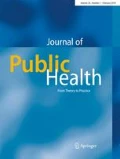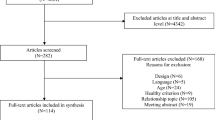Abstract
Aim
The study determines the influences of breakfast in school on the cognitive abilities of pupils including the factors age, breakfast at home and SES.
Subjects and methods
One thousand one hundred eighty-one children and adolescents aged 8 to 18 years (9 primary and 4 secondary schools in Germany) participated in a crossover design. Seven different foods were examined according to the German diet. The test measures used were cognitive domain information processing, memory (KAI: General intelligence) and concentration (KT 3-4 R).
Results
The comprehensive evaluation of all assigned test foods shows a significant improvement in the mental performance for all test parameters. The measured improvement of mental performance increases with the age of the subjects. This is based on the decreasing percentage of children having breakfast at home. Breakfasting at home proves generally more effective compared with breakfast at school. The test food consumed suggests an important difference in the increase of mental performance as a function of their composition.
Conclusion
Based on the results obtained, it is highly recommended to offer breakfast at school, particularly at the secondary school level.






Similar content being viewed by others
References
Adolphus K, Lawton CL, Dye L (2013) The effects of breakfast on behavior and academic performance in children and adolescents. Front Hum Neurosci 7:1–28
Adolphus K, Lawton CL, Champ CL, Dye L (2016) The effects of breakfast and breakfast composition on cognition in children and adolescents: a systematic review. Adv Nutr 7:590–612
Adolphus K, Bellissimo N, Lawton CL, Ford N, Rains T, Totosy de Zepetnek J, Dye L (2017) Methodological challenges in studies examining the effects of breakfast on cognitive performance and appetite in children and adolescents. Adv Nutr 8:184–196
Alexy U, Wicher M, Kersting M (2010) Breakfast trends in children and adolescents: frequency and quality. Public Health Nutr 13:1795–1802
Dickie NH, Bender AE (1982) Breakfast and performance in school children. Br J Nutr 48:483–496
Eissing G (2011) Einfluss der Frühstücksqualität auf die mentale Leistung (the influence of the quality of breakfast on mental performance). Ernährung und Medizin 26:22–27
Eissing G, Düsterhaus A (2015) Der Einfluss sozialer Faktoren auf den “body mass index”. Auswertung der Daten der Dortmunder Schuleingangsuntersuchung (the influence of social factors on the body mass index. Analysis of the data of the school entry health examination in Dortmund). Prävention und Gesundheitsförderung 10:328–334
Eissing G, Molderings M, Nolle-Gösser T, Bönnhoff N (2009) Anamnese des Schulfrühstücks von Grundschulkindern (anamnesis of the school breakfast of primary school children). Ernährungs-Umschau 56:140–149
Genz U (2007) Steigerung der mentalen Leistung durch richtiges Frühstück (increase of mental performance by right breakfast). GEISTIG FIT 6:3–5
Heck-Möhling R, Reinhard J, Boehle J (1993) KT 3-4: Konzentrationstest für 3. und 4. Klassen (concentration test for 3. and 4. Class). Beltz, Göttingen
Heubrock D, Petermann F (2001) Aufmerksamkeitsdiagnostik (diagnostic for attention). Hogrefe-Verlag, Göttingen
Hoyland A, Dye L, Lawton CL (2009) A systematic review of the effect of breakfast on the cognitive performance of children and adolescents. Nutr Res Rev 22:220–243
Iovino I, Stuff J, Liu Y, Brewton C, Dovi A, Kleinman R, Nicklas T (2016) Breakfast consumption has no effect on neuropsychological functioning in children: a repeated-measures clinical trial. Am J Clin Nutr 104:715–721
Kesztyüs D, Traub M, Lauer R et al (2017) Skipping breakfast is detrimental for primary school children: cross-sectional analysis of determinants for targeted prevention. BMC Public Health 17:258. https://doi.org/10.1186/s12889-017-4169-z
Kuntz B, Giese L, Varnaccia G et al (2017) Soziale Determinanten des täglichen Frühstücksverzehrs bei Schülern in Deutschland. Ergebnisse aus KiGGS Welle 1. Prävention und Gesundheitsförderung. Präv Gesundheitsf. https://doi.org/10.1007/s11553-017-0603-4
Lehrl S (2015) Mental fit in der Schule (mental fit in the school). In: Mehlhorn G et al (eds) Begabungen entwickeln & Kreativität fördern. Kopaed Verlag, München, pp 581–624
Lehrl S, Gallwitz A, Blaha L (1978) Kurztest für die Allgemeine Intelligenz. (Short test for general intelligence). VLESS Verlag, München
Lehrl S, Gallwitz A, Blaha L, Fischer B (1991) Geistige Leistungsfähigkeit—Theorie und Messung der biologischen Intelligenz mit dem Kurztest KAI (mental performance—theory and measurement of the general intelligence by the short test KAI). VLESS Verlag, Ebersberg
Lehrl S, Zipp A, Schwarzfischer CH, Eissing G (2016) Kurztest für allgemeine Intelligenz (KAI). Manual für die ppt-version (short test for general intelligence (KAI). Menu for the PPT version). In: Eissing G (ed) Schriftenreihe Arbeitsberichte der Professur für Gesundheitsförderung und Verbraucherbildung 24. Technische Universität, Dortmund
Lozano HR, Ballesteros JC (2006) A study on breakfast and school performance in a group of adolescents. Nutr Hosp 21:346–352
Molderings M, Eissing G (2006a) Evaluation der Elterneinbeziehung in eine gesundheitsförderliche Ernährung von Grundschulkindern (evaluation of the inclusion of parents into the health promoting nutrition of children in primary schools). Empirische Pädagogik 20:169–186
Molderings M, Eissing G (2006b) Schritt für Schritt mach ich mich fit! (Step by step I get fit myself). CARE-LINE Verlag, Neuried
Nell V, Bretz H, Sniehotta F (2004) KT 3-4 R Konzentrationstest für 3. und 4. Klassen – Revidierte Fassung (KT 3-4 concentration test for the 3. and 4. classes—revised version). Beltz Test GmbH, Göttingen
Pivik RT, Tennal KB, Chapman SD, Gu Y (2012) Eating breakfast enhances the efficiency of neural networks engaged during mental arithmetic in school-aged children. Physiol Behav 106:548–555
Rampersaud GC, Pereira M et al (2005) Breakfast habits, nutritional status, body weight, and academic performance in children and adolescents. J Am Diet Assoc 105:743–760
Terschlüsen AM, Müller K, Williger K, Kersting M (2010) Der Einfluss von Mahlzeiten, Nährstoffen und Flüssigkeit auf die kognitive Leistungsfähigkeit bei Kindern (the influence of meals, nutrient and liquid on the cognitive performance of children). Ernährungs Umschau 6:302–307
Wagner G (2017) Schulverpflegung und geistige Leistungsfähigkeit (school nutrition and mental performance). In: Wittkowske S et al (eds) Essen und Ernährung. Julius Klinkhardt, Bad Heilbrunn, pp 61–76
Wagner G, Lehrl S, Hund EM (2011) Beste Noten für clevere Schulmilch (best notes for clever school milk). VFEDaktuell 24:7–11
Wagner G, Lehrl S, Eissing G (2015) Erhöhung des Kreativitätsniveaus durch “gehirngerechte” Ernährung (increasing the level of creativity by the brain suitable nutrition). In: Mehlhorn G et al (eds) Begabungen entwickeln & Kreativität fördern. Kopaed Verlag, München, pp 625–649
Widenhorn-Muller K, Hille K, Klenk J, Weiland U (2008) Influence of having breakfast on cognitive performance and mood in 13- to 20-year-old high school students: results of a crossover trial. Pediatrics 122:279–284
Zubrägel S, Settertobulte W (2003) Körpermasse und Ernährungsverhalten von Jugendlichen (body mass and nutrition behaviour of adolescents). In: Hurrelmann K et al (eds) Jugendgesundheitssurvey – Internationale Vergleichsstudie im Auftrag der Weltgesundheitsorganisation WHO. Juventa Verlag, Weinheim u. München, pp 159–182
Author information
Authors and Affiliations
Corresponding author
Ethics declarations
Conflict of interest
No conflict of interest.
Ethical standards
All procedures performed in studies involving human participants were in accordance with the ethical standards of the institutional and/or national research committee and with the 1964 Helsinki Declaration and its later amendments or comparable ethical standards.
Rights and permissions
About this article
Cite this article
Zipp, A., Eissing, G. Studies on the influence of breakfast on the mental performance of school children and adolescents. J Public Health (Berl.) 27, 103–110 (2019). https://doi.org/10.1007/s10389-018-0926-4
Received:
Accepted:
Published:
Issue Date:
DOI: https://doi.org/10.1007/s10389-018-0926-4




